Autumn Statement
You can find the full autumn statement and all the associated papers here.
Somewhat acerbic summary from Research Professional here,
Some extracts from the statement
Science and Innovation:
- Scientific breakthroughs are a crucial driver of long-run growth and play a critical role in improving lives and helping to tackle societal challenges. The UK hosts many of the world’s leading universities and the government provides the most generous support for business R&D in the OECD as a share of GDP through tax relief and public investment. The government is now going even further to ensure the UK remains at the cutting edge of science, innovation and technological development.
- The Prime Minister has negotiated excellent terms for the UK to associate to Horizon Europe and Copernicus, getting great value for taxpayers while maximising opportunities for researchers. As a result, the government can now announce ambitious investments of over £750 million in UK R&D this financial year. These investments include transformative new programmes, including £250 million for long-term world-class Discovery Fellowships, £145 million for new business innovation support, and support to establish a National Academy focussed on mathematical sciences. The government is also ensuring the research, development and innovation organisational landscape is diverse, resilient, and investable, in response to Sir Paul Nurse’s review. The government will also continue to cut bureaucracy in grant applications.
- University spin-outs are some of the UK’s most innovative companies and play a hugely important role for the UK economy, with investment increasing almost five-fold since 2014. To capitalise on this strength, the government is accepting all the recommendations of the Independent Review of Spin-outs and setting out how it will deliver them. Several universities and investors have already endorsed the recommendations of the review, and the government will provide £20 million for a new cross-disciplinary proof-of-concept research funding scheme, to help prospective founders in the UK’s universities demonstrate the commercial potential of their research.
- Also published: government response to the independent review: https://www.gov.uk/government/publications/independent-review-of-university-spin-out-companies
- Also published: government response to the Paul Nurse independent review of research, development and innovation landscape: https://www.gov.uk/government/publications/research-development-and-innovation-organisational-landscape-an-independent-review
- The government is committed to staying at the forefront of new technology. For example, this Autumn Statement provides £121 million for the UK’s space sector. This investment will pave the way for new space clusters and infrastructure, make progress towards the government’s climate goals by supporting the earth observation industry and deliver new capabilities in low earth orbit satellite communications technology. The government is also building on the £2.5 billion ten-year National Quantum Strategy by publishing an ambitious set of quantum missions, including a mission to have accessible, UK-based quantum computers capable of running 1 trillion operations by 2035. Other missions focus on quantum networks, medical applications, navigation, and sensors for infrastructure.
Life Sciences
- Life sciences is a strength of the UK economy, with the sector critical to the country’s health, wealth and resilience. In May 2023, the government committed £121 million in funding as a first response to Lord O’Shaughnessy’s recommendations on improving the UK’s commercial clinical trial offer. The government has published its full response to the review, supported by an implementation plan, to make the UK one of the best places in the world to conduct clinical research. Up to £20 million of this funding will launch the first Clinical Trial Delivery Accelerator, focused on dementia, to help innovation reach NHS patients even faster.
- To build resilience for future health emergencies and to capture and capitalise on the UK’s R&D strengths, the government is providing £520 million in funding from 2025-26 to support transformational manufacturing investments in life sciences. It is also backing UK innovation by investing £10 million, with an additional £10 million from Scottish Enterprise, in a world class Manufacturing Centre of Excellence in Oligonucleotides. Tackling antimicrobial resistance will be essential for future health resilience, so to mark the 2028 centenary of the discovery of penicillin, the government is granting £5 million seed funding to help launch the Fleming Centre. A collaboration led by Imperial College London and Imperial College Healthcare NHS Trust, the Centre will support the next generation of world changing health innovations.
- The UK is uniquely placed to harness the power of health data to improve patient outcomes. In England the NHS has 1.6 million patient interactions every 24 hours generating real world experience and insights at scale.72 The government is therefore announcing a further £51 million for the Our Future Health (OFH) programme, a world-leading resource for health research, to genotype their first 1 million participants and to recruit hundreds of thousands of new volunteers, supporting the development of better ways to prevent, detect and treat diseases. The COVID-19 vaccine showed the UK is one of the best places to launch lifesaving therapies. Building on this legacy, Genomics England, along with a consortium of partners, is announcing the launch of a world first Rare Therapies Launch Pad, generating evidence on whether a pathway for new individualised therapeutics could be implemented in the UK for children with ultra-rare disease.
Creative industries
- The UK has world-leading creative industries at the heart of an increasingly digital world. The sector grew at over one and a half times the rate of the wider economy between 2010 and 2019,73 contributing £126 billion in GVA in 2022. In June 2023, the government published its Sector Vision which set ambitions to grow the creative industries by £50 billion and deliver a creative careers promise to support a million more jobs by 2030. This included £77 million in new government spending, bringing the total announced since the 2021 Spending Review to £310 million. The sector also continues to be supported by significant tax reliefs, which were worth £1.66 billion in the year ending 2022.75
- The government expects further growth and a rise in employment as creative industries embrace new technologies. To maximise the benefits of this, the government will further boost the international competitiveness of tax incentives for the UK’s world-leading visual effects sector. The government intends to increase the generosity of the Audio-Visual Expenditure Credit for visual effects expenditure, and will work with industry on how best to design this with the intention of implementing changes to the tax relief from April 2025.
- To support the production of film and high-end TV across the UK, the government will provide £2.1 million of new funding next year for the British Film Commission and the British Film Institute Certification Unit. Furthermore, the government will review public investment in R&D spending for the creative industries to a Spending Review timeframe
Making a long-term investment in skills by delivering a world-class education system
- A crucial part of securing Britain’s prosperity for future generations is building a world-class education and skills system. Long-term investment in human capital is crucial for growth and productivity: changes in labour quality contributed to around 15% of growth in labour productivity between 2001 and 2007, and the majority of labour productivity growth in the years after. This is why the government continues to make year on year increases to school funding in England, boost opportunities for adults to train, upskill and retrain, and, from 2025, transform the student finance system through the Lifelong Learning Entitlement.
- In October 2023, the Prime Minister announced a strong action plan to ensure every student has the literacy and numeracy skills they need to thrive through the introduction of the Advanced British Standard. This new Baccalaureate-style qualification will bring the best of A-Levels and T-Levels together, creating a unified structure that puts technical and academic education on equal footing. This reform will ensure every student in England studies some form of maths and English to age 18, boosting basic skills and bringing the UK in line with international peers. It will increase the number of taught hours by 15% for most students aged 16 to 19 and will broaden the number of subjects students take.
- The government is funding a down payment of over £600 million over the next two years. This will give teachers in key shortage academic and technical subjects – who are in the first five years of their career – a payment of up to £6,000 per year tax free, including further education colleges for the first time; support students to achieve their maths and English GCSEs where they did not pass first time; improve the quality of maths teaching; and build a deeper understanding of what works in 16-19 teaching and training with a £40 million capital investment into the Education Endowment Fund.
- Beyond 16-19 education, the government is supporting employer based training in England so that adults of all ages can access high quality apprenticeships. The government has transformed apprenticeships to offer a prestigious and high quality alternative route to higher education. In 2021-22, almost a third of all starts were at Level 4 and above compared to only 4% in 2014-15.
- The government continues to work closely with businesses to improve the apprenticeship system to meet the needs of learners, employers and training providers. The government is supporting plans to catalyse the growth sectors by committing £50 million to deliver a two-year apprenticeships pilot to explore ways to stimulate training in these sectors and address barriers to entry in high-value standards.
King’s Speech
King Charles III delivered his first King’s Speech to open the new parliamentary period on 7 November 2023. The speech is written by the government, not the King, and delivered within Parliament in a ceremony with all manner of pomp and tradition. If you’re interested in the history this article looks at how the custom developed and what themes were apparent in previous monarch’s first state opening speeches.
Onto business, the speech highlighted the broad areas the government intends to move in the forthcoming year. None were a surprise as the government has been announcing them across the last few weeks.
Of most interest to HE:
- Steps will be taken to create the Advanced British Standard qualification, bringing technical and academic routes together.
- Proposals will be implemented to decrease the number of people studying poor-quality degrees, and to increase take-up of apprenticeships. [There’s no new legislation for this so it will be a continuation of the OfS using existing powers and the proposal to include salary (by subject) in the graduate outcomes baselines in licence condition B3. It’s not clear at this stage if there will be more proactive work to increase apprenticeships.]
- Encourage innovation in new technologies such as machine learning and continue to lead international discussions to ensure AI is delivered safely.
- Proposals will be published to reform welfare and support more people into work.
- New legislation to empower police to tackle digital crime, including child sexual abuse.
- New legislation to create a smoke-free generation, by restricting sale of tobacco, as well as the sale and marketing of e-cigarettes to children.
- New legislation to promote the creative industries and support journalism.
Wonkhe also highlight this legislation which will impact on the HE sector:
- A new Terrorism (Protection of Premises Bill) – known as “Martyn’s Law” – will require UK venues including universities to have preventative plans against terror attacks.
- The new Data Protection and Digital Information (no. 2) Billis intended in part to “clarify and improve rules around using data for scientific research.”
The background briefing on these forthcoming Bills is available here.
In addition to the new legislation some Bills of interest to HE were carried over, such as:
- the Economic Activity of Public Bodies (Overseas Matters) Bill 2022-23,
- the Renters (Reform) Bill which will impact student housing
Anything that wasn’t officially carried over is now defunct. This includes any parliamentary questions and Private Members’ Bills you may have been following.
If you’d like to read more delve into content from the House of Lords Library on the 2023 King’s Speech.
The King’s Speech was followed by several days of debate. Secretary of State Gillian Keegan led Friday’s debate failed to answer Labour ex-Shadow HE Minister Emma Hardy’s question about how the government would identify low quality courses while controlling for local and regional differences in graduate salaries. Emma Hardy quoted the words of Lord Willetts to argue from research evidence that parental background also has a huge effect on graduate outcomes. The full transcript is here.
Cabinet Reshuffle
Although headline grabbing in a general sense there wasn’t much change for HE.
George Freeman resigned as Science Minister, replaced by Andrew Griffith:
The minister is responsible for:
- domestic science and research ecosystem, including university research and public sector research establishments (PSREs)
- Innovation Strategy
- international science and research
- Horizon Europe
- space sector
- life sciences
- quantum
- engineering biology
- place and levelling up
- regulation of innovation, including the Regulatory Horizon Council
- R&D People and Culture Strategy
- Advanced Research and Invention Agency (ARIA)
- Government Office for Technology Transfer (GOTT)
- UK Research and Innovation (UKRI)
- UK Space Agency (UKSA)
Nick Gibb resigned as the long standing Schools Minister, replaced by Damien Hinds (another returner after a long period of absence),
Research
UKRI EDI Advisory Group
We mentioned this in the last update but there’s been significant sector interest, and some more movement on the UKRI EDI Advisory Group. On 28 October DSIT SoS Michelle Donelan wrote to UKRI with concerns that individuals appointed to the UKRI EDI advisory group had expressed inappropriate views on social media which weren’t in keeping with their public responsibilities. Michelle recommended for UKRI to immediately close the group and undertake an urgent investigation into how this happened.’
Michelle also suggested that UKRI were overstepping their boundaries by going beyond the requirements of equality law in ways which add burden and bureaucracy to funding requirements, with little evidence this materially advances equality of opportunity or eliminates discrimination.
Wonkhe consider Donelan’s interventions and succinctly explain whether (in their opinion) she has the right to intervene or not. You can read Donelan’s letter and the two Wonkhe blogs: Michelle Donelan writes to UKRI over “jobs for Hamas terrorist sympathisers” and Can the Secretary of State tell UKRI what to do?
In response to the SoS letter UKRI immediately stated they would:
- Suspend operations of the Research England Equality Diversity and Inclusion Advisory Group with immediate effect.
- Launch an investigation into the specific areas of concern.
- Use the findings to come to a conclusion about the ultimate future of the RE EDI advisory group, and how best to ensure its purpose is fulfilled, as advised by the Research England Council.
- The Board would review advisory structures to ensure that they are fit for purpose. This will include the processes for their establishment and operation.
Most recently UKRI Chief Executive, Ottoline Leyser, highlighted that only the EDI Expert Advisory Group’s work had been suspended. All other UKRI EDI initiatives continue their work programmes. And: We are fully committed to the principles of freedom of speech within the law and equality, diversity and inclusion. These are the foundations on which research and innovation excellence is built. I am determined to uphold these principles through the actions we are taking, despite the heightened emotions surrounding these debates at the current time…In line with the principles we espouse, we understand that different people will take different views about the best way to act and we respect their decisions.
REF2028 – overload and dilution?
HEPI published a Policy Note by former Warwick VC Nigel Thrift: REF 2028: Outputs Matter expressing concern that research outputs will be reduced from 60% to 40% and outputs will not be directly tied to individuals. He argues the REF is becoming overloaded and this is diluting its core purpose and putting Britain’s science superpower status at risk.
Last week Sarah was at a research sector gathering and noted a clear divide between those who are extremely concerned with the REF changes including the strong voice of Professor Dinah Birch (who led main panel D in REF2021) and those in favour of progress and changes such as Helen Cross from the Scottish Funding Council who was involved in the FRAP. It feels the tussle for REF 2028 isn’t yet over, not least because Professor Birch is advocating delaying REF past 2028 if the assessment changes are implemented.
The very quick read of Thrift’s policy note is here or read the full seven pages here.
An analysis of REF 2021 impact case studies was published last week exploring the pathways to research impact, and the practices that enable it. Wonkhe report:
- The team identified 79 “impact topics” that highlight the diverse range of areas where UK research is making a difference to policy, practice, and people’s lives. Notably, 72 per cent of impact case studies linked to two or more disciplinary areas. Of the 79 impact topics, those associated with “grand challenges”, such as environmental conservation and food policy, are more likely to be underpinned by interdisciplinary research than those for which disciplinary and professional practice are more closely linked, such as clinical medicine. Research collaboration also features prominently in generating research impact.
- What lessons should be learned from this data? The one that the sector most hopes will be clear is that funding research generates societal benefit – there can be no doubt about that. Some might argue you don’t need an “impact agenda” to know that, but on a purely pragmatic level it really helps to have the evidence.
- The second lesson might be about the links between research culture and excellence – the current debate over the extent to which research culture should form part of the REF is interrogating the extent to which inclusive, cooperative research culture is associated with excellence, and there are almost certainly links to be made around research collaboration, cooperation with non-academic partners, and the engagement of diverse disciplinary perspectives as being research practices that actively support research impact.
- …to what extent should REF incentivise universities to align their research agendas to local challenges as well as grand global challenges? Some would say that it doesn’t matter how far away the impact occurs as long as the research is excellent and impactful. Others might point out that the relative “place-blindness” of research funding until recently has led to a situation in which R&D spend is not very evenly distributed across the country, and that part of universities’ social compact involves deploying their resources for the benefit of their places.
- Universities will, in many cases, already be considering these questions in light of a new focus on place from funders, some of which will materialise in the next iteration of REF. But it is always worth considering the extent to which local research impact forms part of a university’s agenda and how that ambition might be realised in time for the next big assessment.
Blogs:
- Analysis of research impact sheds light on the many ways that UK research makes a difference. A RAND Europe research team sets out the key findings of their new study.
- If levelling up is still on the agenda, funders need to measure – and incentivise – the impact of research in institutions’ backyards. Jonathan Grant and Martin Szomszor make the case.
- A set of new reports affirm the benefits of Scottish university research to the economy and to wider society. Lesley Yellowlees explains what they’re all about.
AI news
Similar to previous weeks, there’s a significant amount of artificial intelligence (AI) related news. We’ve kept content as brief as possible so do click the links for more information if this is your interest area.
Medical diagnostics (AI): The House of Lords published part two of their Current Affairs Digest: Science. It looks at how advances in AI are changing medical diagnostics. Once trained on vast datasets of images and research AI tools have been designed to interpret scans, refine images for clinical review, and map anatomy ahead of treatment. It looks at whether AI can save clinician time, costs and workload. Thes briefing presents a range of studies on applications, accuracy and challenges.
£118m AI Package: The Government announced a £118m “boost to skills funding”, including a new grant scheme and confirmation of a further 12 Centres for Doctoral Training in AI (£117 million), funded through UKRI. The remaining £1 million creates the AI Futures Grants scheme to help the next generation of AI leaders meet the costs of relocating to the UK- it’s currently being designed and will launch in 2024. The British Council and UK universities are also funding 15 GREAT scholarships for international students to come to the UK to study Science and Technology courses, including subjects related to AI or life sciences. The ‘Backing Invisible Geniuses’ (BIG) scholarship pilot is being launched. It’s led by the Global Talent Lab and champions outstanding high-school performers in International Science Olympiads, setting them on a path to excel in maths, science, and AI. Funded by XTX Markets and in partnership with DSIT. The government intends to create a new dedicated visa scheme for the world’s most talented AI researchers to come to the UK on internships and placements, early in their careers, to encourage them to build their careers, ideas and businesses.
AI Safety Summit: For weeks the government has been building up to the AI Safety Summit at Bletchley Park. You can read a summary of the Summit’s discussions provided by DSIT and the summaries of the eight roundtables are here.
Announcements:
- Michelle Donelan announced the government’s Frontier AI Taskforce and leading British researchers will be equipped with supercomputers to analyse the safety of advanced AI models.
- The investment into the AI Research Resource has been tripled to £300m, up from £100m announced in March 2023, in a bid to further boost UK AI capabilities. This will bolster Isambard-AI (Bristol University) announcement and will connect Isambard-AI to the newly announced Cambridge supercomputer called ‘Dawn’.
- The connection of the two new supercomputers means researchers will be able to analyse advanced AI models to test safety features and drive breakthroughs in drug discovery and clean energy (from summer 2024). The Frontier AI Taskforce will have priority access to the connected computing tools to support its work to mitigate the risks posed by the most advanced forms of AI. The resource will also support the work of the AI Safety Institute, as it develops a programme of research looking at the safety of frontier AI models and supports government policy with this analysis.
AI safety institute: DSIT published further information about the new AI Safety Institute. The creation of the Institute was announced by the Prime Minister in a speech at The Royal Society. It will focus on advanced AI safety for the public interest, minimising surprises to the UK and humanity from rapid and unexpected advances in AI. It will work towards this by developing the sociotechnical infrastructure needed to understand the risks of advanced AI and enable its governance. Read more about its three core functions here:
- Develop and conduct evaluations on advanced AI systems
- Drive foundational AI safety research
- Facilitate information exchange.
The Frontier AI Taskforce has been subsumed within the AI Safety Institute to continue its safety research and evaluations. The other core parts of the Taskforce’s mission will remain in DSIT as policy functions: identifying new uses for AI in the public sector; and strengthening the UK’s capabilities in AI. Ian Hogarth continues as Chair of the AI Safety Institute and the External Advisory Board for the Taskforce will now advise the AI Safety Institute. A Chief Executive of the Institute will be recruited.
Quick research news round-up
Ex-Science Minister George Freeman announced the recipients of over £14 million funding for the UK’s quantum sector. He described how the government is continuing with its ambition to become a quantum-enabled economy by 2023 and broke the £14+ million down into the following elements:
- The launch of a UK Quantum Standards Network Pilot that will help to ensure that the UK is at the forefront of establishing global standards for quantum
- Over £10m in funding for 6 projects to accelerate the development of components and systems for quantum network technologies
- Over £4m to strengthen collaborative research and development through Canada-UK partnerships to develop real-world quantum technologies for commercial use
- The National Quantum Computing Centre (NQCC) closing its £30m competition to provide quantum computing testbeds, alongside a partnership with IBM to provide users cloud access to IBM’s full fleet quantum machines
- A new science and innovation agreement with the Netherlands to deepen collaboration on quantum which will see closer cooperation covering research and development, commercialisation, investment, and skills
Full details here.
Horizon Europe PQ: Shadow Universities Minister Matt Western asked the government to assess the potential impact on the (a) finances and (b) reputation of individual universities of not having participated in the Horizon programme for two years; and to publish the 10 most affected universities. The government stated that the Horizon Europe Guarantee scheme meant no UK researchers has been left out of pocket, and that 2,600 grant offers (£1.39 billion) had been made by end September 2023.
RIF allocations: At the end of October UKRI released the 2023-24 Regional Innovation Fund (RIF) grant allocations to institutions (total £48.8 million for England). All HE institutions receiving HEIF will receive a RIF allocation. More detail here.
Spinouts: Wonkhe – The government should push universities to offer a two-track system for spinouts, with a “light touch” option taking a small equity stake for those who do not want additional support from technology transfer offices. This is according to a report from the Tony Blair Institute, Onward and the Startup Coalition on the need to harness artificial intelligence. The report also recommends reform to the High Potential Individual Visa so that it applies to graduates from a wider range of universities internationally, in particular institutions with a specialism in technology.
REF 2028 Parliamentary Question: Q – Ben Lake – will the SoS for DSIT meet with representatives of the Universities Policy Engagement Network to discuss the implications for Departments of the REF2028 requirement that universities demonstrate (a) impact and (b) engagement.
Answer – George Freeman: The design and implementation of the REF 2028 is being carried out by the devolved funding bodies of the UK nations, including Research England in England. During this process the funding bodies have engaged widely with stakeholders, including many of the members of the Universities Policy Engagement Network (UPEN), on the design of the next REF. This engagement, including a currently open opportunity to provide written comments, will continue through the autumn and the final design of the REF will take full account of stakeholders’ contributions to the engagement process. [Note, the consultation mentioned is actually closed now.]
Economic Activity of Public Bodies (Overseas Matters) Bill
Prior to the prorogation for the King’s Speech, the Economic Activity of Public Bodies (Overseas Matters) Bill 2022-23 was debated in the House of Commons at Report Stage against the backdrop of increased tension in the Middle East. Labour called for the Bill to be delayed or withdrawn due to the geopolitical context. Margaret Hodge MP (Labour) also criticised the Bill stating it was flawed and would not solve the problem of the Boycott, Divestment and Sanctions (BDS) movement and accused the Conservative party of introducing it for party political point scoring. She was also concerned it would inflame recent community tensions on university campuses and in workplaces.
During the debate several MPs spoke about the antisemitism and Islamophobia following the 7 October attacks and examples of antisemitism on campus were cited.
Previous Secretary of State for Education, Kit Malthouse (Conservative), introduced his amendment which requested universities were exempted from the Bill. He believes that aspects of the Bill run contrary to the recent HE Free Speech Act and the work of the new OfS Free Speech tsar. Kit also felt including universities would be another step towards universities being classed as public bodies – which he was opposed to – because the Treasury had taken on significant debt when FE colleges had become public bodies and the government risked greater debt should they bring universities into the fold. He requested his amendment be considered and did not present the amendment for a vote.
Chris Stephens (SNP) spoke to Clause 4 stating the Bill would, in effect, prevent elected councillors and university Vice-Chancellors from publishing public statements indicating intention to act in ways that would contravene the ban. He highlighted that anti-boycotts laws in the US had curbed freedom of expression. Angela Rayner (Labour) also spoke to the Clause 4 gagging clause and stated Labour believed it was incompatible with Article 10 of the European Convention on Human Rights (ECHR) – she called on MPs to remove or amend the Clause. David Jones (Conservative) also spoke out against Clause 4 again highlighting the HE (Freedom of Speech) Act 2023; he stated the Clause was an unacceptable constraint on free speech and a deeply un-conservative measure – he called for the removal of the Clause from the Bill.
Angela Rayner also outlined her amendment which would allow public bodies to produce a document setting out their policy on procurement and human rights. She said this could ensure that ethical considerations could be applied equally to all countries rather than singling out individual nations, adding consistency and avoiding the critique from some around Israel having special treatment.
John McDonnell (Labour) argued that BDS actions should be seen as an overall tactic rather than solely in the current Israel/Palestine context, citing BDS actions throughout history including for apartheid South Africa, and more recently for Russia and Iran. MPs from both sides of the House raised concerns that the only states and territories explicitly named on the face of the Bill, were Israel, the Occupied Palestinian Territories (OPTs), and the Golan Heights. Angela Rayner said that this showed how the government were failing to treat Israel like any other state or nation, despite the Secretary of State previously claiming the Bill would be non-country specific. Angela highlighted how the Bill would apply as much to China, Myanmar and North Korea, as it does to Israel and this would have significant impact on the ability for e.g. communities to support Uyghur minorities in China.
George Eustice (Conservative) stated including the OPTs and the Golan Heights alongside Israel on the face of the Bill could send a signal that the UK had changed its longstanding position of a two-state solution and that the Israeli settlements in the occupied territories were illegal. He warned the government against equating Israel with those territories.
Kit Malthouse outlined his cross-party amendment which sought to remove the prohibition on the government specifying Israel, the OPTs or the Occupied Golan Heights as a country or territory to which the prohibition on boycotts does not apply. He said that this was seeking to ensure that Israel was treated like any other country in the world and avoid adding fuel to the argument that it receives special treatment, which he said gave rise to antisemitism.
Michael Gove, Secretary of State for Levelling Up, Housing and Communities, responded on the government’s behalf stating he appreciated the debate came at a sensitive time, but that the House was united in their horror of terrorism, their desire for peace and belief in a two-state solution. He highlighted that the Bill was introduced following a manifesto commitment, made prior to the current conflict in the Middle East. [This is significant because when the Bill reaches the House of Lords, while they can amend and offer challenge protocol dictates they should not deliberately oppose manifesto commitments.] Gove acknowledge the debate concerns but felt they had misunderstood the provisions and intention of the Bill. He said the Bill did not prevent any individual from articulating their support for the BDS campaign, rather it prevented public bodies and public money from being used to advance these ideals. On free speech, again he said the Bill would not affect individuals right to free speech but prevent public bodies themselves from making their own foreign policy. Finally, he said that the Bill did not prevent human rights considerations from being taken into account by public bodies, and that the Bill made it clear that legitimate human rights considerations, provided that they are noncountry-specific, should be taken into account.
All amendments were rejected and the Bill passes to the House of Lords unamended.
Education Questions
The DfE ministerial team answered Education Questions. Here is the content most relevant to HE:
- Rosie Duffield (Labour) highlighted the regular use of food banks among the student community, questioning what the government were doing to support students and staff that were forced to turn to food banks. Halfon, Universities Minister, stated the Government had frozen tuition fees and provided £276 million student premium funding. He added that it was important to provide a system that was fair for students and the taxpayer, and that prioritised the most disadvantaged.
- Lilian Greenwood (Labour) highlighted that the maintenance loan had fallen £1,500 in real terms since 2020/21. She said the cost-of-living crisis was affecting students’ education and physical and mental health; she challenged the Minister on whether this was acceptable. Halfon responded that the government were doing everything possible to support the most disadvantaged.
- Matt Western, Shadow HE Minister, highlighted the increased level of paid work among students, and the negative impact it was having on their studies. He asked Minister Halfon whether he expected students to balance paid employment with university work, and to acknowledged it was forcing many students out of higher education. In his reply, Minister Halfon stated: Actually, the opposite is true. We have a record number of students going to university. Disadvantaged students are 71% more likely to go to university now than they were in 2010. We have a huge package of support. I have mentioned the £276 million for disadvantaged students. We are doing everything we can to help disadvantaged students. The hon. Gentleman criticises the money we are giving but does not come up with a figure of his own. Warm words butter no parsnips.
- Carol Monaghan MP, SNP spokesperson (Education): The Minister mentions some things that are maybe trying to help these students, but recent Higher Education Policy Institute analysis shows that students who previously received free school meals are less likely to complete their degree and those who do are less likely to get a first or a 2:1. Support cannot stop once they get to university. She asked the Minister to detail what support he is giving those students at every stage of their journey to make sure they really do have the same opportunities as those from more privileged backgrounds. Halfon responded: Many universities offer bursaries to students…we are doing everything possible to ensure that students who do courses get good skills and good jobs at the end. That is the purpose of our higher education reforms…
There were also a number of questions on Higher Technical Qualifications (HTQs) – you can read the content here (scroll down the page to locate the HTQ questions).
Growth for the sector
Lord Willetts (and the Economy 2030 inquiry*) published How higher education can boost people-powered growth. The report notes the success of HE and rejects the claim that there are too many university degrees. It calls for reforms to the system to properly fund HE and to support new innovative universities to enter the market. The report recommends:
- An open, evidence-based debate about the calibration of the graduate repayment scheme so the system is adjustable and reflects changing political judgements. Via a once every five years review of fees and loan terms so the system can be modified without tearing it all up and starting again.
- Banks could be invited to partner with universities to buy the debt of a university’s graduates from the Student Loans Company.
- The DfE could launch a competition inviting applications to create a new university with a particular focus on places that do not currently have one.
If you prefer the short version Lord Willetts wrote about the recommendations in Conservative Home: This is the moment to seize the opportunity for growth in apprenticeships and higher education.
* The Economy 2030 inquiry is not a Select Committee or a Select Committee inquiry – it’s the name of a collaboration between the Resolution Foundation and the Centre for Economic Performance at the London School of Economics.
Rip off degrees
Minister Halfon dodged responding to a parliamentary question requesting the Government state which degree courses they plan to increase controls for to prevent rip-off university degrees (reference: Crackdown on). Halfon used the Prorogation of Parliament to state they wasn’t enough time to respond to the question before the parliamentary session closed. Let’s hope Charlotte Nichols (who tabled the question) reintroduces it in the new session so we can receive the official government word on the matter.
Meanwhile Wonkhe have managed to find the time and have highlighted that OfS published prioritisation criteria for its 2024 quality round, stating where it (OfS) sees the greatest risk to student outcomes. The OfS areas for quality focus for the year ahead are as expected: business and management courses, foundation year provision, and franchised provision. There’s a blog: England’s higher education regulator has announced its areas of focus for its next round of inspections. Snippet: What is OfS getting at? The combination of mentions of integrated foundation years, business courses and subcontracting is very interesting – partly because a good hypothesis is that all three characteristics make up a good chunk of the story in the DfE figures on foundation years that were released recently. Wonkhe suggest universities for whom all three areas of focus intersect should prepare for the ‘boots on the ground’.
Mental health
The Minister for HE has suggested that he might ask the OfS to consider a licence condition to require universities to take more action to address mental health. In a speech to a UUK conference, Robert Halfon said:
- I’d like to begin by paying tribute to all the student services staff who work on the frontline, day in, day out, to support students. You are there for them on their hardest days at university. You strive to help them find a way through. You do it because you care – because you want the best for your students.
- … In my year as Minister for Higher Education I have made this an absolute priority. There are 3 pillars to our approach: Funding vital services and projects; spreading and implementing best practice; and clear responsibilities for providers and protection for students.
- The first pillar is about investing in the wellbeing of students. To provide nationwide access to free mental health resources and confidential support, we provided Student Minds with £3.6 million to set up Student Space. Over 450,000 students have now benefitted from this service, including those who recently braved the “freshers” experience… We are backing university wellbeing services to support these students as part of this year’s £15 million investment in mental health by the Office for Students (OfS)
- Our second pillar is about best practice. We need to create the right conditions on campus for students to thrive through a whole-university approach to mental health. This means not just relying on student wellbeing services. It means everyone, from the Vice Chancellor down to the librarian takes responsibility for creating an environment and culture that supports positive mental health and wellbeing. The principles for achieving this are laid out in the University Mental Health Charter. ..Thanks to the hard work of university staff, and the backing of your leaders, you have delivered an incredible 50% increase in University Mental Health Charter Programme membership over the summer. We’re now at 96 universities, which is a big step – perhaps even a giant leap – closer to our target of all universities joining by September 2024.
- Clear responsibilities for providers and protection for students:…
- I wrote to university leaders in June to ask them to take ownership of mental health at an executive level. The sector needs to come together to finish the job of embedding the guidance that has been set out.
- I now want to turn to the work of Professor Edward Peck, and take this opportunity to thank him for all the progress he has made since his appointment as HE Student Support Champion. This summer I asked Edward to build on that work and chair the Higher Education Mental Health Implementation Taskforce – a vehicle for delivering real change… The taskforce will conclude its work in May next year, providing an interim update in early 2024.
He ended:
- As I’ve said before, I am confident we have a strong plan in place, but I don’t rule out going further if needs be. If we do not see the improvements we need, I will not hesitate to ask the Office for Students to look at introducing a new registration condition on mental health.
- Ultimately, we must do what it takes to provide the safety net that students and their loved ones expect and deserve as they embark on the amazing privilege of university life.
Not off the hook yet…
The House of Lords has continued their theme of inquiring into regulation. They’ve published a new inquiry into UK regulators. It’s described as a short and cross-cutting inquiry into UK regulators as a whole (including the OfS), with a specific focus on roles, remit, independence and accountability.
The inquiry will examine whether regulators as a whole have been given a clear job to do and whether their roles and remits are sufficiently discrete from one another. The inquiry will also examine whether regulators are appropriately independent of Government, including whether the right balance is being struck between strategic and political input from government and preserving regulators’ operational independence.
The inquiry will further examine how regulators should be held to account for their performance, and by whom – including the respective roles of the Government and of Parliament.
Lord Hollick, Chair of the Industry and Regulators Committee, said: The committee has recently conducted scrutiny of regulators including Ofwat, Ofgem, and the Office for Students. A common area of concern arising from all these inquiries is the relationship between the regulator and the Government, and the level of independence and accountability regulators have. Many regulators are public bodies funded by the taxpayer and have significant powers; it is therefore vital that they are scrutinised and held to account.
Quality
UUK report on the QAA’s (Quality Assurance Agency for HE) latest policy paper in the Future of Quality in England series: The right ambition, the wrong solution? How the Lifelong Learning Entitlement can deliver a high-quality learning experience.
UUK: The paper argues that the eligibility and scope of modules included within the Lifelong Learning Entitlement (LLE) is too narrow, and that pathways for progression throughout a learner’s lifetime are unclear. It outlines ways in which the learning experience will need to be adapted for modular learners and how this will impact the way quality is measured. The paper recommends that policymakers should:
- Balance the option of working towards a full qualification with accessing a suite of standalone modules.
- Facilitate greater collaboration with the sector.
- Use evidence to determine how quality is measured. You can read the full policy paper.
Short summary available from QAA here.
Modules
UUK published their response to the OfS call for evidence on positive outcomes for modular study. The response includes:
- Welcoming the OfS’ approach to policy development.
- Agreeing with the OfS that the approach to regulation will need to change because of the LLE.
- Supporting the exploration of completion measures for modular study.
- Recognising the importance of understanding where students go after studying, whether that’s through further study or employment.
- Considering how the reflective questions in the Higher Education Statistics Agency (HESA) graduate outcomes dataset could inform what successful study looks like for modular learners.
Student Finance
The Minister for the School System and Student Finance, Baroness Barran, announced the introduction of regulations to allow plan 2 (undergraduate), plan 3 (postgraduate) and plan 5 (undergraduate) student loan interest rates to be capped automatically each month, where they would otherwise exceed comparable prevailing market rates.
There’s also to be a change to the calculation of the overseas fixed instalment repayments for plan 1 student loans (1998 to 2012) with the amended fixed instalment rate increasing to be equivalent to the monthly repayments of a plan 1 student loan borrower earning twice the median working age graduate salary in England. The Minister stated that this would remove a perverse incentive whereby higher earning borrowers residing overseas may have chosen not to submit their earnings information to the SLC in order to reduce their monthly payments.
Student loans: Wonkhe – The Student Loans Company has posted provisional figures for its student finance dispersals in the current academic year – over £5bn in total, of which £2.06bn are tuition fee payments to providers.
Quick Student News
Commuter students: Shadow universities minister Matt Western: asked for an estimate of the number of domestic students commuting to university campuses in each of the last five years. HE Minister Halfon stated the closest approximation of commuter students shows the proportion remains at around one in four between 2018/19 and 2021/22.
Grades: Wonkhe report – Graduate employers are less inclined to focus on grades when looking for suitable employees – just 44 per cent of the 169 organisations surveyed by the Institute of Student Employers asked for a 2:1 or above, down from 76 per cent a decade ago…This year’s ISE Recruitment Survey also reveals that graduate vacancies are up six per cent on last year, but the average organisation receives 86 applications per vacancy (up 23 per cent on last year). It describes graduate employers as “cautiously optimistic”, but notes that less is being spent on recruitment. Overall, 92 per cent of employers were either “often” or “almost always” able to find the graduate employees they need. The Telegraph covers the report. Blog: The chief executive of the Institute of Student Employers shares the findings of this year’s survey of student recruiters.
Student deaths: Wonkhe – The government’s review of student suicides has come in for criticism from #ForThe100, the campaign in support of bereaved families. On Wonk Corner, Jim Dickinson goes over the issues.
Healthcare courses: Wonkhe – Recent UCAS data indicates that healthcare-related courses are not as attractive to applicants as they used to be. If the last time you looked at this area of provision was during the pandemic’s peaks of aspiration, more recent data will make it clear that all Universities UK, the Medical Schools Council, and the Council of Deans of Health have responded to the NHS Long Term Workforce Plan with a call for thoughtful reform of medical and healthcare provision and funding.
And UUK published Universities Powering the NHS: Working together to deliver future health skills. The paper sets out actions to meet the NHS Long Term Workforce Plan goals. Snippets: Universities fully recognise the challenges involved in such a radical expansion and transformation of health education system capacity…Success will depend on cross-party commitment to support and fund the plan across the next 15 years, which includes general elections and spending reviews.
UUK recommendations:
For universities and the NHS to work together successfully, five system conditions need to be addressed:
- a strategic shift within higher education to dramatically expand health education capacity
- a culture shift within the NHS to value and support learners and educators and improve the working environment
- implementation must be co-produced to an agreed roadmap
- funding must be sustained across the plan’s 15-year horizon
- regulation must be aligned, outcomes-based and adaptive
There are also five threshold conditions that need urgent attention:
- student recruitment including widening participation
- the educator and clinical academic pipeline
- capital investment to boost system capacity
- extending and diversifying placements and practice-learning
- health student and early career attrition
BU’s medical simulation game is featured under case studies.
Regional graduate premium: blog – Data on the graduate premium in the UK’s regions suggests some struggle to make the most of graduate-level skills. Debbie McVitty tries to work out what’s going on.
Political News
Dods provide a roundup of the Labour Party’s recent policy statements in The Labour Policy Roadmap – post-conference update. A sectoral breakdown of the party’s pledges and ambitions. Of interest to HE is their commitment to ban unpaid internships, however, it’s not a blanket policy as they caveat their policy commitment to allow unpaid internships when part of an education or training course.
They also commit to:
- Reform university tuition fees system to lower pay-back costs for graduates.
- Increase private and public R&D spending to 3 percent of GDP, improve collaboration between universities, business and local economic institutions, enable universities to develop self-sustaining local clusters of innovation and investment, and Introduce 10-year R&D funding settlements to support innovation.
- Create more medical school places.
- Create 7,500 more medical school places, 10,000 more nursing and midwifery clinical placements per year, and train 5,000 more health visitors.
- Include a creative or vocational subject as one of the non-EBacc subjects in pupil’s Progress and Attainment 8.
HE statistics
The DfE published the education and training statistics with the most recent data on schools, attainment, qualifications gained, education expenditure, further education and higher education in the UK.
For HE there were 2,972,33 higher education (HE) students in 2021/22, of which 72% were undergraduates and 28% were postgraduates.
- More females than males made up the overall student population (57%) and females made up a greater share at every level.
- The most popular subject was Business and Management with 18% of all students enrolled (over half a million students), followed by Subjects allied to Medicine (12%) and Social Sciences (10%).
- The majority of students studied full-time but proportionally more females than males studied part-time (23% vs. 19% respectively across all course levels).
- In 2021/22, 23% of all HE students were from overseas (681,600 students).
- Overall, 4% of 19 to 64-year-olds held a NQF level 4 or above in 2022 – 67% had level 3 or above, and 83.1% had level 2 or above.
- Total UK government expenditure on education across the UK increased by 5.1% from financial year 2021-22 to financial year 2022-23.
- Primary and secondary education saw an increase in spend of 2.2% and 7.1% respectively, while tertiary education saw a 3.6% decrease in spend.
- Expenditure on education in real terms decreased by 1.3% from financial year 2021-22 to financial year 2022-23. Expenditure on education as a percentage of Gross Domestic Product (GDP) decreased by 0.1 ppts.
DfE also published the statistics which measure HE participation by school cohorts, calculating the proportion of the population aiming to complete a qualification at HE level (measured at age 15, excludes apprenticeship HE hopes).
Full data here.
Applicants
UCAS published the first statistical release of the 2024 undergraduate cycle highlighting applicant numbers for HE courses (with the early October deadline). Dods highlight the key findings:
- The number of UK 18-year-olds from the most disadvantaged areas (POLAR 4 quintile 1) is at a record high, with 3,160 students having applied, up by 7% from the 2023 cycle (2,950). 17,080 of the most advantaged (POLAR4 quintile 5) have applied this year compared with 16,720 last year, up by 2%.
- A total of 72,740 have applied to start an undergraduate course with an October application deadline in 2024, down by 2% from last year (74,090), but up by 6% from 2020 (the October 2019 application deadline, for autumn 2020 entry) – the last pre-pandemic cycle (68,690).
- In total, there have been 39,310 UK 18-year-olds apply by the deadline, the second highest number on record. This is up by 2% since 2023 (38,660) and up by 11% since 2020 (35,290).
- The total number of UK 18-year-olds who have applied to medicine is 11,750, which is down by 7% since last year (12,700), but up by 8% since the October deadline for 2020 entry (10,930).
- The number of UK students aged 35 and over applying to medicine for the first time (230) is up from 170 in 2023 (+31%), down from the record of 260 in 2021. This is the largest year on year percentage increase since 2021 (up 39%).
- There has been a 18% decrease in the total number of UK 19-year-old applicants – which is 5,580 this year, but down from 6,770 in 2023.
- The total number of international students (all ages) who have applied is 20,850, which is down from 2023 (20,970) but up from 2019 (20,280).
- China remains the largest source market for international applicants; however the number of applicants from China is down 1% from 2023 (but up 31% against the October deadline for 2020 entry). The USA and Singapore have had the largest growth in applicants since last year, with applicants from USA increasing by 9% and Singapore by 6%.
- There has been a 6% increase in UK domiciled applicants declaring receipt of free school meals. This is in the context of rising numbers of pupils in England receiving free school meals.
Access & Participation
The House of Commons Library briefing paper Support for care leavers provides an overview of the government’s policies to support care leavers.
The Women and Equalities Committee has endorsed the appointment of Alun Francis as chair of the Social Mobility Commission, following a pre-appointment hearing.
Wonkhe blog: Universities are often failing to enable disabled doctoral students to access their education. Pete Quinn explains a new research report on what can be done to change things.
Wonkhe also outline a new report from TASO examining the effectiveness of four interventions at universities in England – either intended to support disabled students, or improve employability – as well as making recommendations on the evaluation methods used. It notes that evaluations of the “scope and calibre” of those considered in the report are “time-consuming and resource-intensive”, and recommends institutions invest in further evaluation capacity and consider whether academics can provide support with evaluation.
The Sutton Trust published 25 Years of University Access – How access to HE has changed over time. They state it reveals persistent gaps for poorer students, particularly at the most selective universities. Key findings:
- Over the last 25 years there has been a substantial increase in the number of young people going to university, with 50% of young people going on to higher education by age 30 for the first time in 2017.
- Proportional gaps in access to university by under-represented neighbourhoods (POLAR) have narrowed over that time, though the gap itself remains significant.
- Russell Group share of disadvantaged and low participation area students has declined since 1997 compared to the rest of the sector.
- 4,700 state school students and 1,000 students from areas of the country with low historic participation ‘missing’ from 30 most selective universities each year – these students have the required grades but don’t get places.
- Students from London are considerably more likely both to apply and to go on to attend higher education, with the rest of the country falling further behind each year.
- Male students have fallen further behind female students and entry rates for White young people have lagged behind other ethnic groups.
- These stubborn gaps persist despite considerable efforts from universities, government and the third sector to improve access rates. This emphasises the scale of the challenge in tackling access gaps in an environment with substantial social inequalities, and increasing demand for a limited resource (places at the most prestigious universities).
- Widening participation efforts have likely prevented POLAR gaps from growing further. Groups promoting widening access in some senses have been ‘running to stand still’. In contrast, where access efforts have had less focus, for example on region, ethnicity or gender, gaps have widened.
Recommendations:
- Tackling the access gap is likely to become more, rather than less challenging in the medium term, as a population bulge goes through the higher education system.
- Universities should make greater use of contextual offers, taking into account the wider circumstances of applicants when accessing their potential.
- It is also vital that universities are properly monitored and held to account on their progress in widening participation.
- Findings show the importance of looking at how several different aspects of someone’s background and identity can impact on their likelihood of going onto university, and that it is important to look at these factors in combination, as well as overall trends for each group.
- In the longer-term, we cannot tackle access issues at university level without also tackling the education attainment gap earlier on in a young person’s journey. This should start from the early years onwards, with efforts made at every part of the education system to ensure all young people can fulfil their potential.
International
Parliamentary question what assessment the government has made of the impact of changes to student visas on international students coming to the UK.
The International Higher Education Commission published Is the UK developing global mindsets? The challenges and opportunities for Internationalisation at Home in driving global engagement The report suggests a decline in the international diversity of UK campuses with the loss of incoming Erasmus+ exchange students and UK students’ decline in foreign language studies contributing. To address this the report recommends actions to enhance the advantages of internationalisation at home, including strengthening capacity and capability across various aspects of internationalisation.
The QAA published another policy paper within the Future of Quality in England series. Instilling international trust in English HE – a quality perspective argues that England’s HE international reputation is integral to its role as one of the UK’s biggest assets. It highlights that this reputation is built on trust, which is at risk of being undermined by divergence from international commitments in quality, unhelpful political rhetoric, and a lack of collaborative global outlook.
The briefing contends that, if steps aren’t taken to reinforce international trust, there are potential risks to international student recruitment, international research funding and mutually beneficial international partnerships. To reinforce international trust, the paper recommends that:
- Policymakers should publicly champion the higher education sector on the world stage.
- The Government should adopt a collaborative global outlook.
- Make changes to England’s external quality system to increase international trust.
Inquiries and Consultations
Click here to view the updated inquiries and consultation tracker. Email us on policy@bournemouth.ac.uk if you’d like to contribute to any of the current consultations.
Other news
Good relations: Advance HE updated their guidance on promoting good relations in HE. Covering how to prevent intolerance and develop a culture where relationships between diverse groups and individuals enhance the learning experience, protect freedom of speech and academic freedom, tackle harassment, and contribute to an inclusive society. It supports institutions to take a proportionate approach in decision making and suggests immediate, medium and long-term strategies for promoting good relations within the present legal framework. It is recommends that institutions should consider any incidents of hate and intolerance or situations where free speech and good relations intersect on a case-by-case basis within the framework of agreed policies, seeking specific legal advice where necessary.
Subscribe!
To subscribe to the weekly policy update simply email policy@bournemouth.ac.uk. A BU email address is required to subscribe.
External readers: Thank you to our external readers who enjoy our policy updates. Not all our content is accessible to external readers, but you can continue to read our updates which omit the restricted content on the policy pages of the BU Research Blog – here’s the link.
Did you know? You can catch up on previous versions of the policy update on BU’s intranet pages here. Some links require access to a BU account- BU staff not able to click through to an external link should contact eresourceshelp@bournemouth.ac.uk for further assistance.
JANE FORSTER | SARAH CARTER
VC’s Policy Advisor Policy & Public Affairs Officer
Follow: @PolicyBU on Twitter | policy@bournemouth.ac.uk
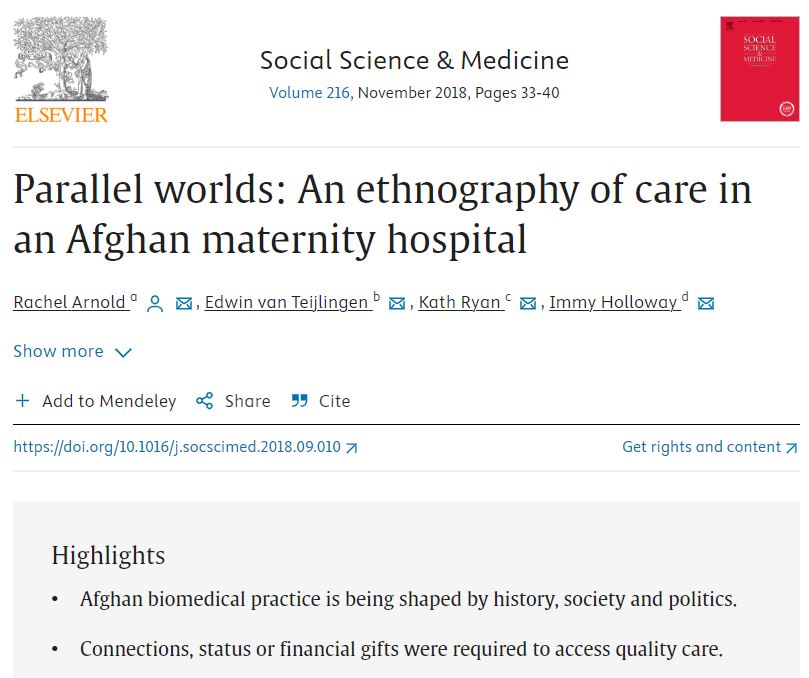
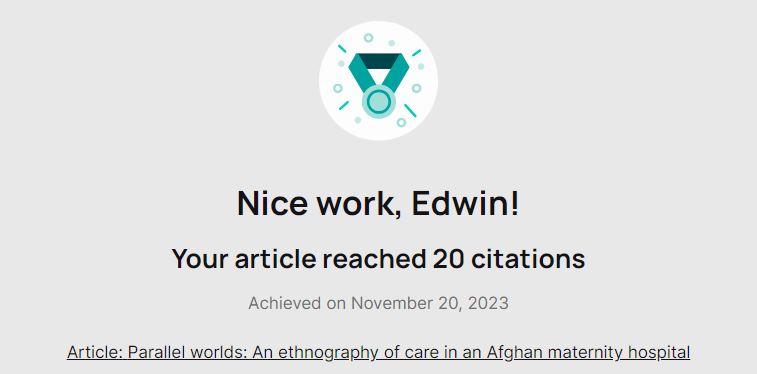
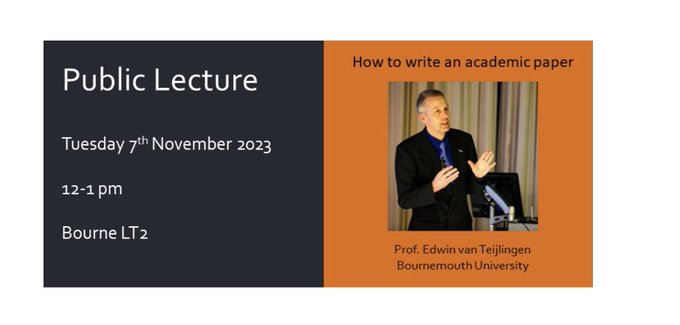 Professor Edwin van Teijlingen in the Centre for Midwifery & Women’s Health (CMWH) has been invited to speak at Royal Holloway, University of London, about writing an academic paper. His public lecture will be coming Tuesday lunch time in the appropriately named ‘Bourne Lecture Theatre’ at Royal Holloway. Prof. van Teijlingen, together with several Bournemouth University (BU) colleagues, has published a text book [1], several book chapters [2-18] and a large number of papers [19-38] about a wide-range of aspects of academic writing and publishing. One of former BU academics, who co-authored a book chapter [10], and two papers [21, 25], is Dr. Preeti Mahato. She is Lecturer in Global Health at Royal Holloway as well as Visiting Faculty in BU’s Faculty of Health & Social Sciences.
Professor Edwin van Teijlingen in the Centre for Midwifery & Women’s Health (CMWH) has been invited to speak at Royal Holloway, University of London, about writing an academic paper. His public lecture will be coming Tuesday lunch time in the appropriately named ‘Bourne Lecture Theatre’ at Royal Holloway. Prof. van Teijlingen, together with several Bournemouth University (BU) colleagues, has published a text book [1], several book chapters [2-18] and a large number of papers [19-38] about a wide-range of aspects of academic writing and publishing. One of former BU academics, who co-authored a book chapter [10], and two papers [21, 25], is Dr. Preeti Mahato. She is Lecturer in Global Health at Royal Holloway as well as Visiting Faculty in BU’s Faculty of Health & Social Sciences.
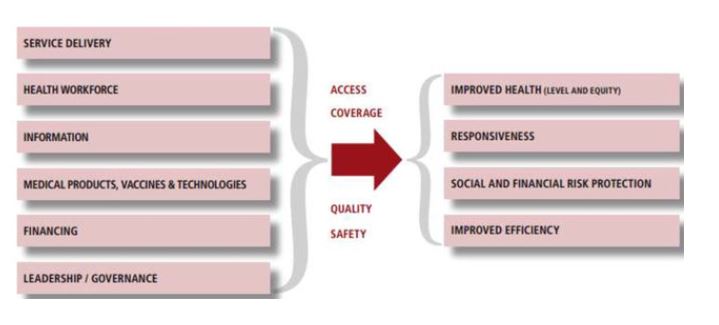
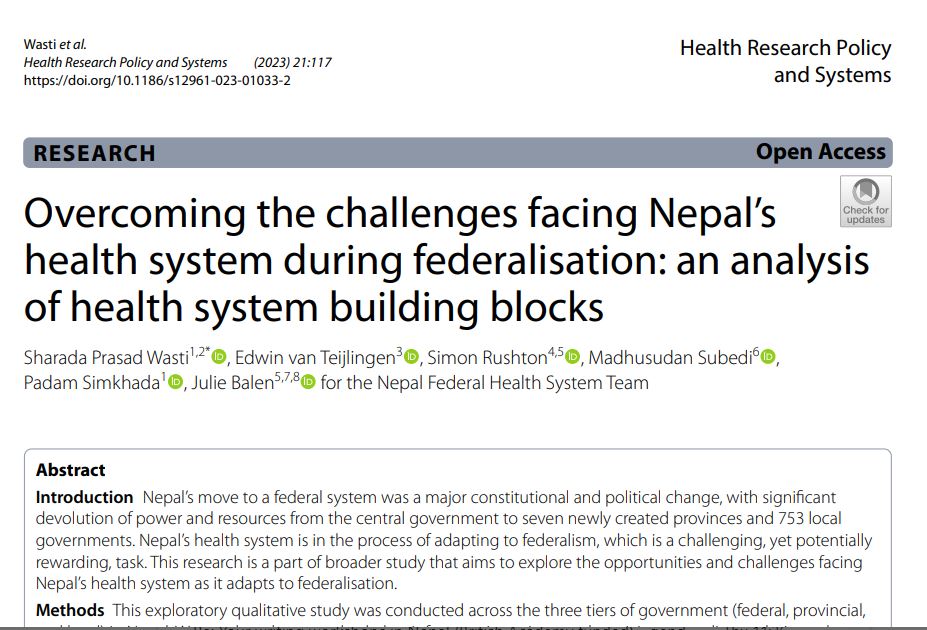
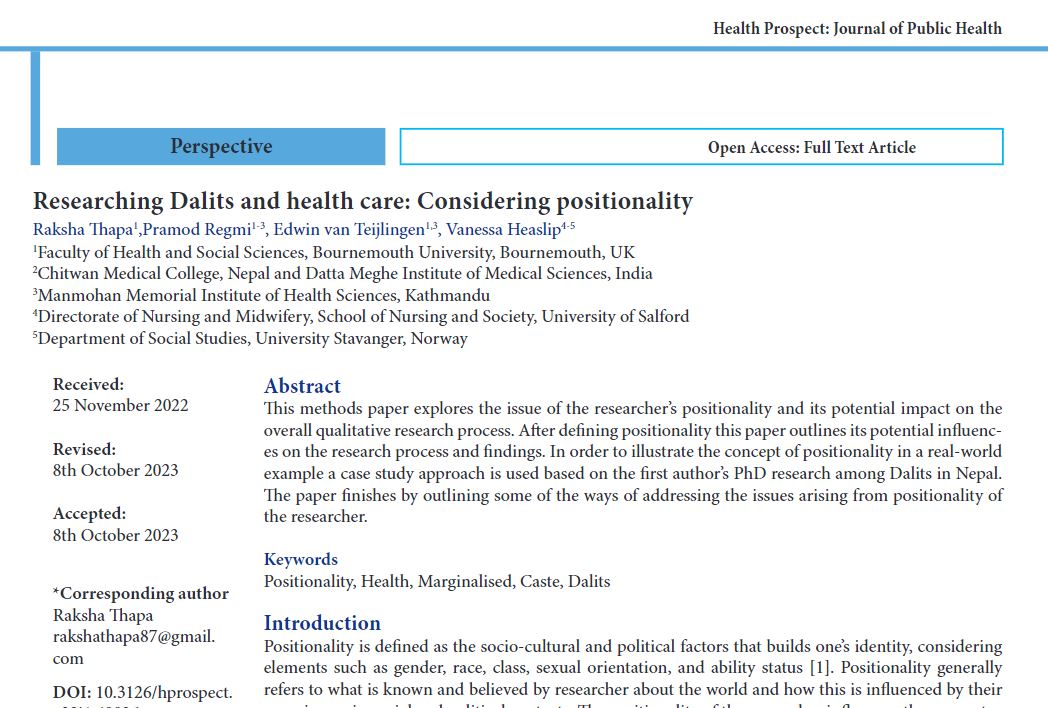

 The initiative brings together four universities:
The initiative brings together four universities:  Session 1, led by
Session 1, led by 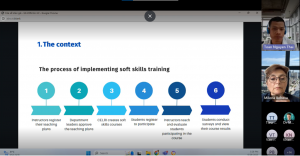 Session 2, led by
Session 2, led by  Session 3, presented by
Session 3, presented by 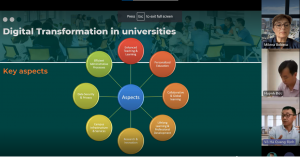 The closing session, led by the
The closing session, led by the 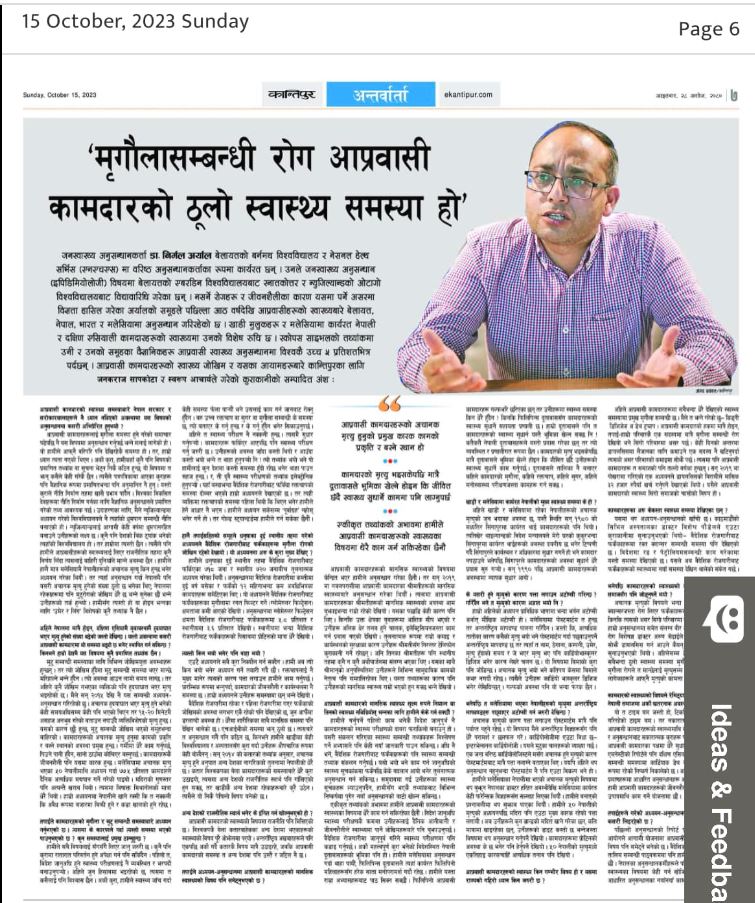

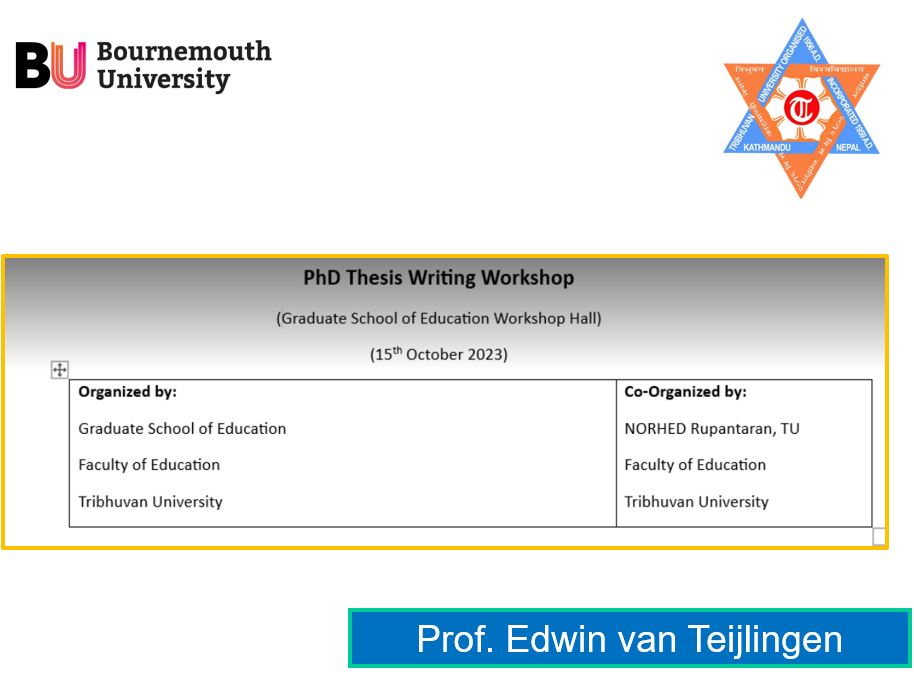

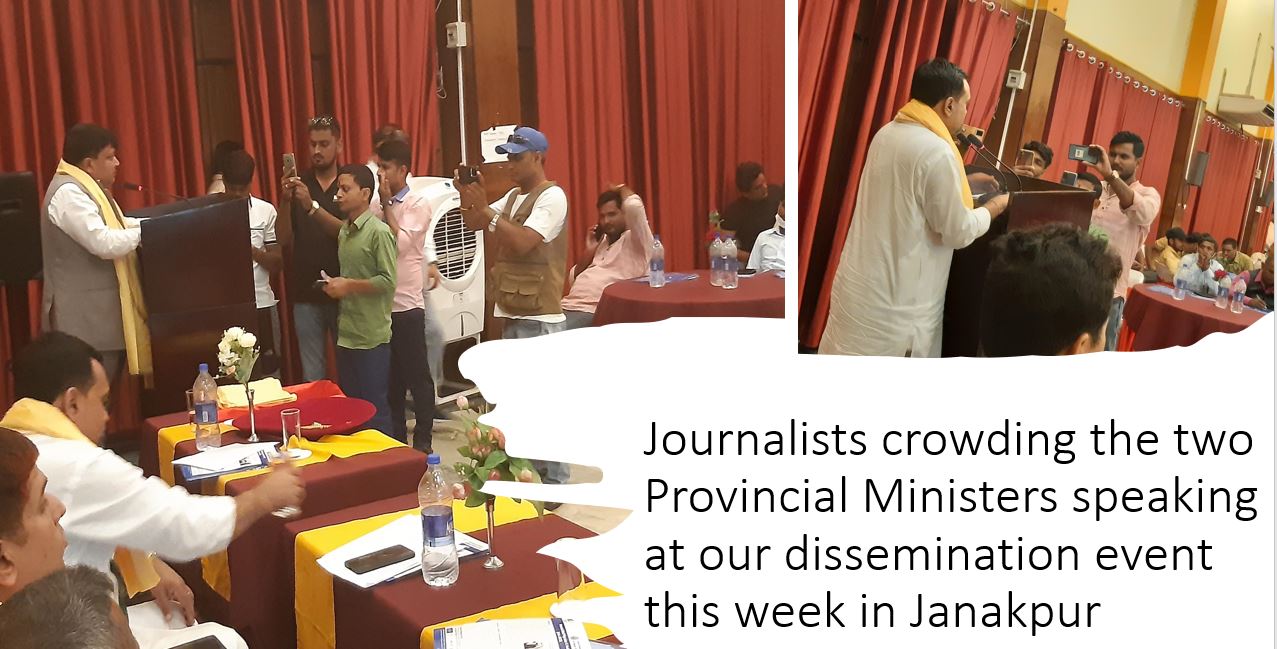
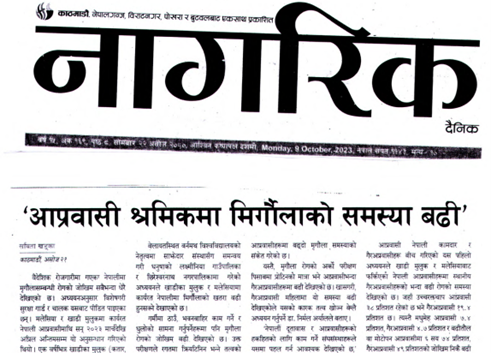

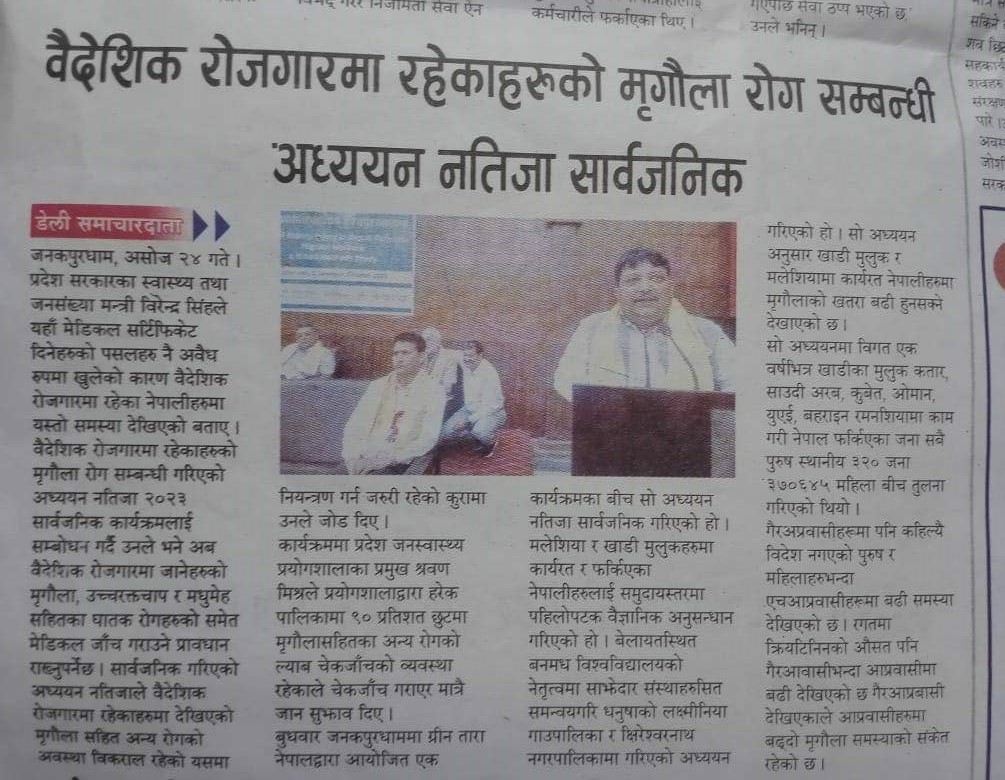
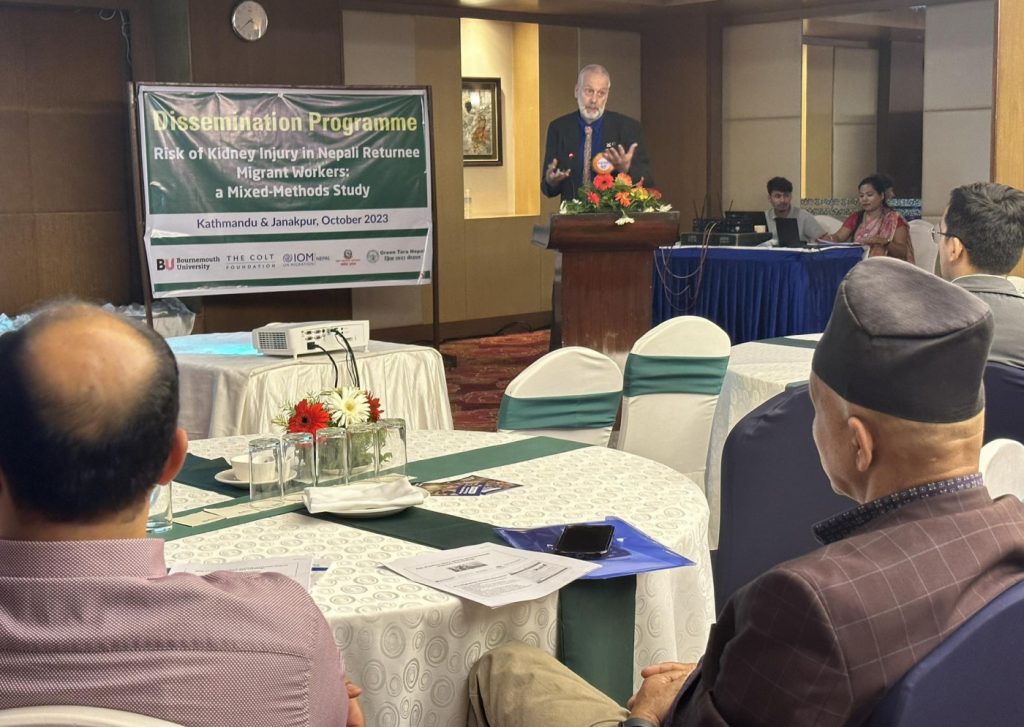
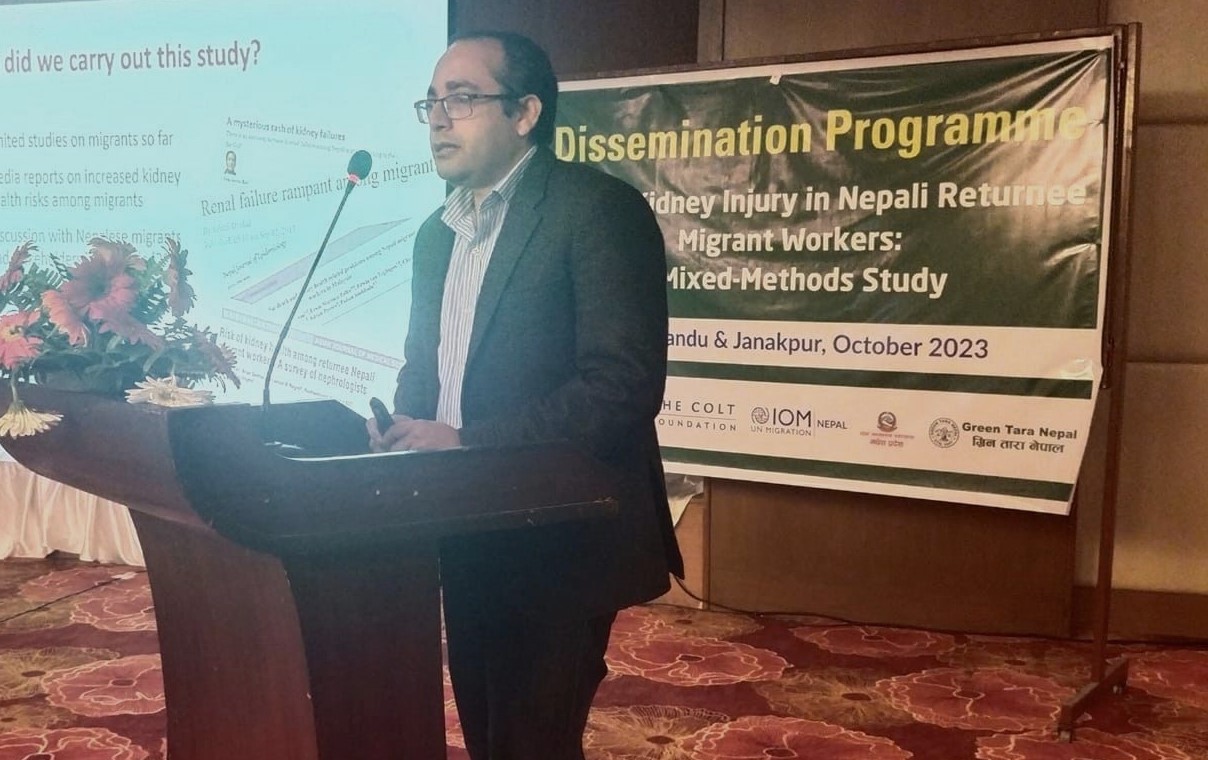

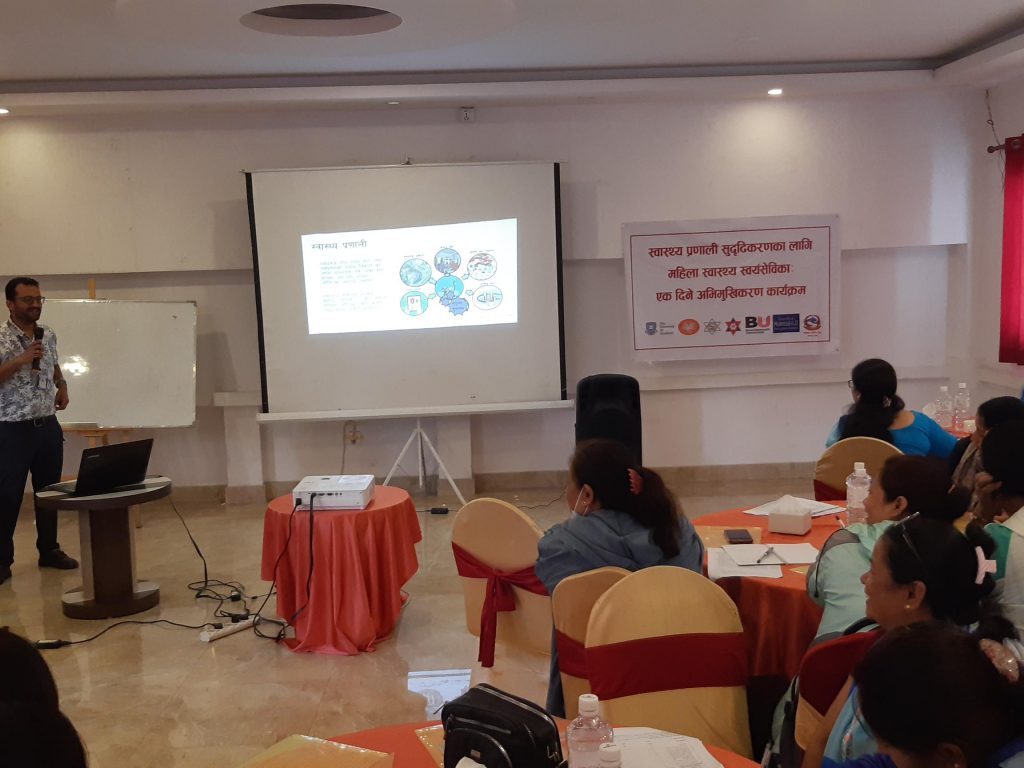
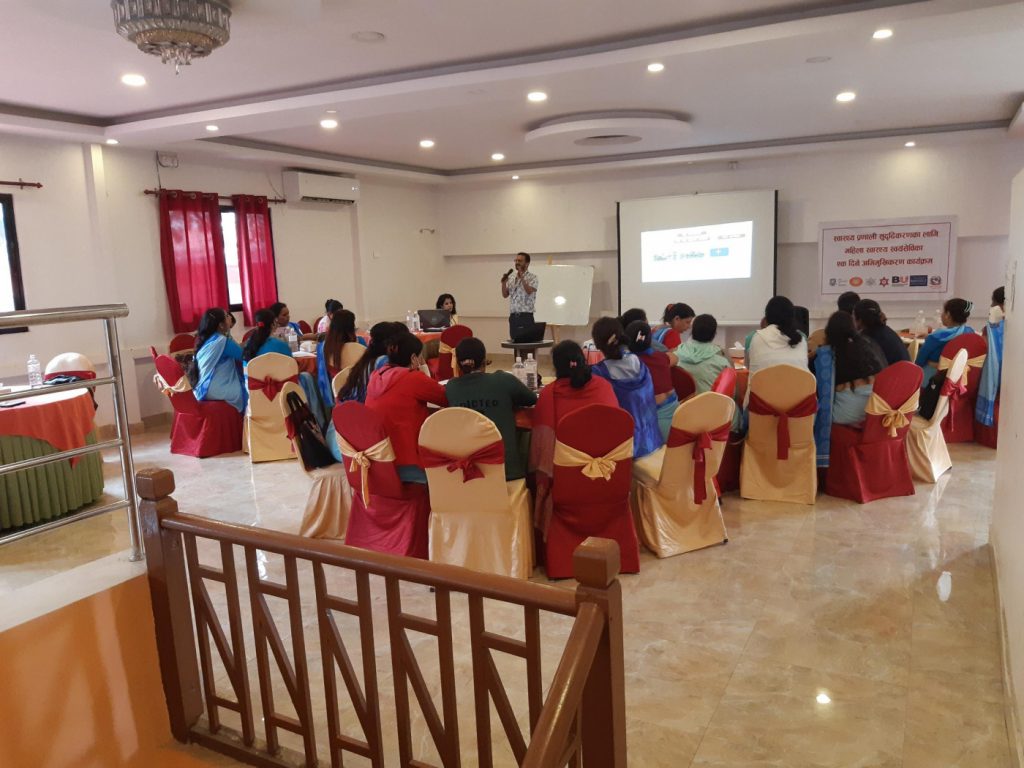
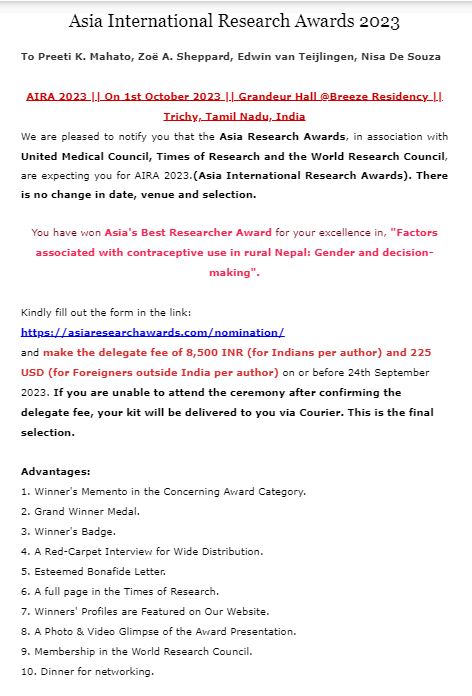












 SPROUT: From Sustainable Research to Sustainable Research Lives
SPROUT: From Sustainable Research to Sustainable Research Lives BRIAN upgrade and new look
BRIAN upgrade and new look Seeing the fruits of your labour in Bangladesh
Seeing the fruits of your labour in Bangladesh Exploring Embodied Research: Body Map Storytelling Workshop & Research Seminar
Exploring Embodied Research: Body Map Storytelling Workshop & Research Seminar Marking a Milestone: The Swash Channel Wreck Book Launch
Marking a Milestone: The Swash Channel Wreck Book Launch ECR Funding Open Call: Research Culture & Community Grant – Application Deadline Friday 12 December
ECR Funding Open Call: Research Culture & Community Grant – Application Deadline Friday 12 December MSCA Postdoctoral Fellowships 2025 Call
MSCA Postdoctoral Fellowships 2025 Call ERC Advanced Grant 2025 Webinar
ERC Advanced Grant 2025 Webinar Update on UKRO services
Update on UKRO services European research project exploring use of ‘virtual twins’ to better manage metabolic associated fatty liver disease
European research project exploring use of ‘virtual twins’ to better manage metabolic associated fatty liver disease